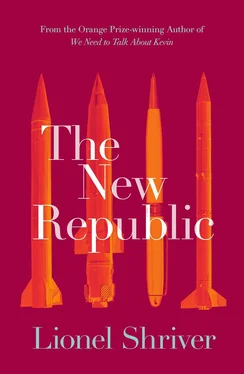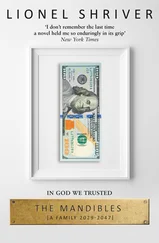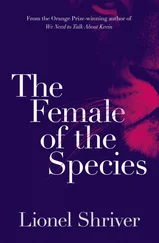But then, Falconer’s fortunes had been easy to follow. A foreign correspondent first for U.S. News and World Report , then, seminally, for the National Record , he filed peripatetically from Beirut to Belfast to Sarajevo. More than once he’d won a prize for covering a story that was especially risky or previously neglected, and these awards filled Edgar with a baffling mixture of irritation and pride. Of course, Edgar had chosen the far more lucrative occupation. Yet he’d learned to his despair how little money was worth if it couldn’t buy you out of slogging at seven a.m. into a law firm you reviled. “Well compensated” was an apt turn of phrase, though in the end he couldn’t imagine any sum so vast that it could truly offset flushing twelve, thirteen hours of every waking day down the toilet.
When Edgar ditched his “promising” career in corporate law (though what it promised, of course, was more corporate law) in order to try his hand at journalism six months ago, he’d been reluctant to examine in what measure this impetuous and financially suicidal reinvention might have been influenced by his old high school running buddy—who, having always obtained the funnier friends, the prettier girls, and the sexier summer jobs, had naturally secured the jazzier vocation. If Toby Falconer and Edgar Kellogg were both drawn to journalism in the fullness of time, maybe the convergence merely indicated that the two boys had had more in common at Yardley Prep than Edgar had ever dared believe as a kid.
Dream on. To imagine that he bore any resemblance to Falconer in adolescence was so vain as to be fanciful. Toby Falconer was a specimen. No doubt every high school had one, though the singular was incongruous as a type; presumably there was no one else like him.
A Falconer was the kind of guy about whom other people couldn’t stop talking. He managed to be the center of attention when he wasn’t even there. He always got girls, but more to the point he got the girl. Whichever dish you yourself envisioned with the bathroom door closed, she’d be smitten with our hero instead. Some cachet would rub off, of course, but if you hung with a Falconer you’d spend most of your dates fielding questions about his troubled childhood. A Falconer’s liberty was almost perfectly unfettered, because he was never punished for his sins. Anyway, a Falconer’s sins wouldn’t seem depraved but merely naughty, waggish, or rather enchanting really, part of the package without which a Falconer wouldn’t be the endearing rogue whom we know and love and infinitely forgive. Besides, who would risk his displeasure by bringing him to book? He did everything with flair, not only because he was socially adroit, but because the definition of flair in his circle was however the Falconer did whatever the Falconer did. To what extent a Falconer’s magnetism could be ascribed to physical beauty was impossible to determine. Good looks couldn’t have hurt; still, if a Falconer had any deviant feature—a lumpy nose, or a single continuous eyebrow—that feature would simply serve to reconfigure the beautiful as archetype. A Falconer set the standard, so by his very nature could not appear unattractive, make a plainly stupid remark, or do anything awkward at which others would laugh, save in an ardent, collusive, or sycophantic spirit.
Hitherto Edgar had been the Falconer’s counterpart, that symbiotic creature without which a Falconer could not exist. The much admired required the admirer, and to his own dismay Edgar had more than once applied for the position. While he’d have far preferred the role of BMOC if the post were going begging, he was eternally trapped by a Catch-22: in yearning to be admired himself, he was bound to admire other people who were admirable. Which made him, necessarily, a fan.
To date, the only weapon that had overthrown a Falconer’s tyranny was cruel, disciplined disillusionment. Sometimes a Falconer turned out to be a fraud. Lo and behold, he could be clumsy, if you kept watch. At length it proved thoroughly possible, if you forced yourself, to laugh at his foibles in a fashion that was less than flattering. Wising up was painful at first, but a relief, and when all was said and done Edgar would be lonely but free. Yet taking the anointed down a peg or two was a puzzling, even depressing exercise, in consequence of which he reserved his most scathing denunciations for the very people with whom he had once been most powerfully entranced.
Edgar’s public manner—gruff, tough, wary, and deadpan—was wildly discrepant with his secret weakness for becoming captivated by passing Falconers, and he worried privately that the whole purpose of his crusty exterior was to contain an inside full of goo. He couldn’t bear to conceive of himself as a sidekick. Having ever been slavishly enthralled to an idol of any sort shamed him almost as much as having once been fat. Hence of Edgar’s several ambitions at thirty-seven the most dominant was never to succumb to the enchantment of a Falconer again.
It was in the grip of precisely this resolution that Edgar Kellogg had marched out of Lee & Thole six months ago, determined to cast off the dreary Burberry of the overpaid schmo. At last he would grow into the grander mantle of standard-bearer, trendsetter, and cultural icon. It was in the grip of this same resolution that Edgar set off for his four p.m. job interview with the National Record . He’d had it with being The Fan. He wanted to be The Man.
“Win, that you? Guy Wallasek at the Record . I know it’s been three months, so this is a formality—I’m way past the mother-hen stage. But Saddler hasn’t deigned to show his face in Barba, has he? … Here? At this point, he wouldn’t dare … I stand corrected. Whatever Saddler lacks in consideration, he makes up in gall.” The lardy editor covered the receiver’s mouthpiece and murmured to his four p.m. appointment, “Be right with you.”
Edgar squinted at framed Pulitzers, nodding, pretending to be impressed. These props exhausted, from the lamp table he picked up a rectangular coaster, laminated with a reduced front page from the National Record , RED ARMY OVERTHROWS GORBACHEV GOVERNMENT. The byline, hard to make out, began with a B. He’d change places with that reporter in a New York minute. Chasing tanks with a microcassette beat the dickens out of filing another prospectus for public offering. The window behind Guy Wallasek afforded an uninspiring view of solid green glass; soon Edgar would run out of ostensible fascinations. He didn’t want to seem to lose himself in the copy of today’s Record , implying that he hadn’t read it.
The desk chair squealed as Wallasek leaned back. “I’d sure like to give him a piece of my …” The big man chuckled. “Yeah, I’m kidding myself. I’d probably fix our prodigal a cup of tea. I’m only his boss, right? … Me? At first I assumed it was a stunt. Another one. But what would Saddler do with more attention? Keep it in jars? And that peninsula of yours is such a snake pit …”
Edgar’s face was stiff from keeping an unnaturally pleasant I’m-in-no-hurry expression in place for ten minutes. Wallasek could easily have made this call before their appointment. And why bother with the power play? Edgar would have stripped to his boxers and danced the cha-cha for a chance to write for Wallasek’s foreign desk.
The editor guffawed, shooting Edgar a glance to make sure he felt left out of the joke. “You do see him,” Wallasek went on, “tell Barrington next time he takes a vacation maybe he could send a postcard. Lucky for the Record the story’s gone into deep freeze. The SOB hasn’t claimed so much as a faulty Chinese firework since Saddler went AWOL, right?
Читать дальше












